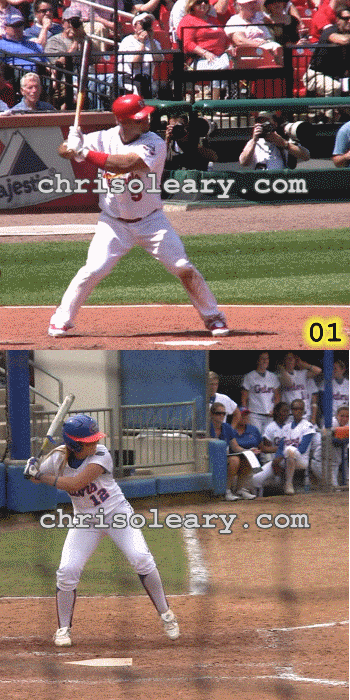Reviews of Baseball and Fast Pitch
Softball Hitting Books
There are a large number of baseball and fast pitch softball
hitting books out there that purport to
teach the major league swing and that are written by former
major leaguers and other professional baseball players, coaches,
and scouts. The
problem is that most of those books are written by people whose
pedigrees would lead you to believe that they should know what a good swing looks like, but prove by the
photographs, diagrams, and illustrations in their books that they don't.
That is a real problem for people who are interested in
Rotational
Hitting and the major league swing, so I have put together
this page of reviews of baseball and fast pitch softball hitting
books to help solve that problem.
Evaluation Criteria
When I review a book that talks about baseball or fast pitch
softball hitting, I do so using three criteria. The first
criterion I use to evaluate a hitting book is whether — through
the
photos, diagrams, and illustrations used in the book — the author demonstrates that
they understand what is really going on in good swings, like the
ones below.

The Swings of Albert Pujols and Megan Bush
The second criterion is whether the author knows a good swing
— and a bad swing — when
they see one. It should be
obvious that it's hard to develop a good swing in a player if you don't
understand what a good swing actually looks like. The third criterion
I use when evaluating baseball and fast pitch softball hitting books is the likelihood
that the drills that are discussed in the book will lead to the
development of a good swing.
With
those three criteria in mind, let me review some of the baseball
and fast pitch softball books that are out there.
   
The Science of Hitting
Ted Williams and John Underwood
The Science of Hitting, by Ted Williams and John Underwood is
the cream of the crop. The only reason I gave it 4 stars rather
than 5 is that there are two minor problems with it. The first
is that good hitters don't adjust to the height of the pitch by
varying the angle of their back knee. The other is that the
swing plane typically isn't quite as flat as some of the
illustrations suggest.
  
Mike Epstein on Hitting
Mike Epstein
Mike Epstein on Hitting was the first book to talk
about Rotational Hitting. While it's not perfect (for one thing it's extremely
redundant and repetitive), much of the information in it is
solid and it is definitely better than the majority of the
hitting books
out there.
 
Hit Like A Big Leaguer
Jack MaLoof
Hit Like a Big Leaguer by Jack Maloof is yet another book by
a guy with a good pedigree who doesn't seem to understand what a
good swing actually looks like. It's full of standard, and
wrong, advice like swinging level to the ground and squishing
the bug. He also labels as flaws things that good hitters
actually do.
 
The
Art of Hitting .300
Charley lau Sr.
Not only did Charley Lau Sr. not know a good swing when he
saw one, apparently George Brett didn't understand his own
swing. The book is full of pictures of George Brett doing
things that he never did when he actually swung the bat.

The Making of a Hitter
Jack Perconte
The Making of a Hitter by Jack Perconte is the worst book on
hitting that I have yet to come across. For one thing, he labels
as flaws (Chicken Winging) things that good hitters actually do. The most (accidentally)
amusing part of the book is the admission by the author that he
never hit for power. By reading what he advocates in this book,
it's obvious why that was the case.
|

